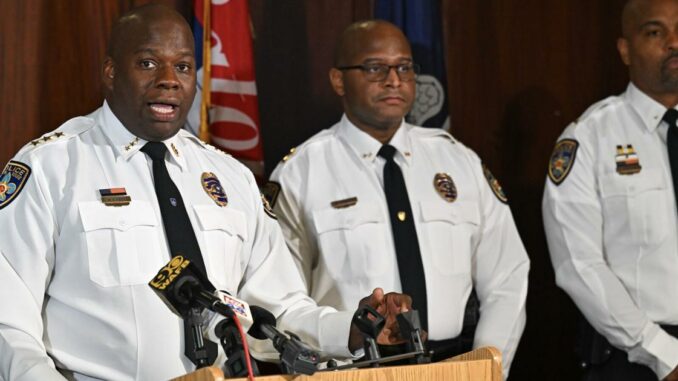
Tapped to lead the Baton Rouge Police Department through a period of public scrutiny following the police killing of Alton Sterling, Chief Murphy Paul has long touted his agency’s commitment to transparency.
But recently, records show, Paul’s administration has taken pains to stifle circulation of documents, civil service election records and other information with a secretive and unorthodox tool: non-disclosure agreements that bar dozens of patrol officers, detectives and even some of Paul’s top deputies from revealing what transpires within the agency’s halls.
The legal documents govern a wide swath of behavior, prohibiting officers from disclosing to outsiders what occurs within the hiring process, the department’s internal affairs branch and the organizing of civil service elections. A public records request showed officers have signed 77 of the documents since 2020. Some officers have signed multiple agreements.
It’s normal for police agencies to bar officers from disclosing sensitive information. For instance, most departments, including BRPD, have policies protecting details from open cases, which Paul has repeatedly said “protect the integrity of the investigations.” Inquiries from reporters pass through designated media officials.
In a statement, Baton Rouge Police Department spokesperson Porcha Thompson said the use of NDAs represents “just another instance of that common practice.”
But using non-disclosure agreements to further restrict information is unusual within government agencies, according to legal experts, former officers and policies governing police departments across the United States. Some experts fear the agreements could stifle the release of public records or hamstring job applicants from speaking out about hiring-related discrimination.
Police departments typically act carefully in deciding which information to release to the public, said Ian Adams, a policing expert at the University of South Carolina.
“There’s some good reasons for this in terms of protecting investigations, but the same methods can also be used to shut down dissent,” Adams said.
The use of non-disclosure agreements is not the first case where Paul’s administration cracked down on the release of information. In 2021, the department sought to have a civil rights lawyer held in contempt for releasing body camera footage of a juvenile suspect being strip-searched — a move that earned the department a scathing rebuke from a federal judge.
Critics of Paul’s administration say the non-disclosure agreements add to a pattern of the department using internal discipline to intimidate rank-and-file officers the administration dislikes.
“It’s my belief that these NDAs are used as a way to strike fear into the hearts of officers unnecessarily,” said John Dauthier, a former homicide detective, internal affairs investigator and uniform patrol officer in BRPD who has emerged in recent years as one of Paul’s most vocal critics. He reviewed the documents at The Advocate’s request.
The department did not make Paul available for an interview.
Baton Rouge Police Chief Murphy Paul, center, speaking in April about a compensation study his department during a meeting of the metro council, Wednesday, April 25, 2018, at City Hall in Baton Rouge, La. With him are deputy chief Jonny Dunnam, left, and Union president Sgt. Bryan Taylor.
A rare tool in government
Commonly used to protect sensitive private-sector information, non-disclosure agreements are contracts between one or more parties agreeing that information exchanged between them will remain confidential.
Use of the agreements by government agencies is not normal, experts say, including within law enforcement offices. Public information officers at a dozen departments across the country, including the East Baton Rouge Sheriff’s Office, the Mobile Police Department in Alabama and the San Francisco Police Department said their agencies do not use such agreements.
“I have never heard of something like that,” said Jodi Silva, a Houston Police Department spokesperson.
The agreements within BRPD bar officers from disclosing four kinds of information.
Thirteen officers agreed not to disclose records and other unspecified information from within the department’s administration and its internal affairs division, which handles discipline and investigates claims of officer misconduct. Eight signed NDAs barring the release of test results and interviews with officers up for promotion.
Another 18 officers agreed not to divulge election lists and other material related to the department’s civil service elections, where officers elect a peer to represent the department on a board that hears disciplinary cases and can change punishments handed down by the chief. The board has been consumed by controversy in recent years as Paul has waged public fights against the local police union and some of his officers through the discipline process.

A billboard along Airline Highway near BRPD headquarters, paid for by the Baton Rouge Union of Police.
Lastly, 39 officers signed NDAs agreeing not to disclose questions, discussions, answer keys, the background checking process and other interactions between police department interviewers and applicants.
Notably, the documents hold officers to confidentiality long after they’ve left the police department: Officers must await “written notification” from the department to be released from the agreements, the documents say.
A potential ‘workaround’
Some high-profile names appear on the list of officers who signed the agreements, including top police brass like Deputy Chief Troy Lawrence Sr. and Deputy Chief Myron Daniels. Paul himself signed an NDA agreeing not to disclose aspects of the promotional process; so did former interim Police Chief Johnny Dunnam.
Most current and former officers who signed the agreements could not be reached and some declined to comment, citing fear of retaliation.
Thompson, the BRPD spokesperson, said the documents are meant to define the confidential material officers must protect — and to clarify existing penalties for acting in ways that violate that policy, she said.
The agreements seem to do little more than reiterate policies already on the department’s books, said Jill Craft, a Baton Rouge lawyer who frequently represents officers in employment disputes. Penalties for violating the agreements are the same as under existing policy, the records say.
But distributing NDAs to officers holds broader implications than simply reiterating policy, experts say. Breaking one can qualify as breach of contract and can yield a lawsuit, meaning Paul could possibly sue his own officers for violations.
In the context of policing, NDAs could also have a chilling effect on the release of some public information, Craft said — things like officers’ internal files detailing their disciplinary histories.
Barring the release of internal affairs records through non-disclosure agreements could also create a “workaround” to public records precedents, Craft said. One such precedent arose when The Advocate sued BRPD for officer disciplinary records; a judge ruled then that the department must hand over some redacted internal disciplinary files to a reporter.
This is not the first time that nondisclosure agreements have raised concern among Baton Rouge officials.
Last fall, the East Baton Rouge Parish Attorney’s Office faced scrutiny for requiring city-parish employees to sign NDAs amid a debate over a new drainage fee. Furious over what they saw as a lack of transparency, metro council members overwhelmingly rejected the fee, sending Mayor Sharon Weston Broome’s administration back to the drawing board.
Asked if the Parish Attorney’s office advised BRPD on the use of NDAs, Thompson declined to comment. Parish Attorney Andy Dotson did not return an email message.

Leave a Reply